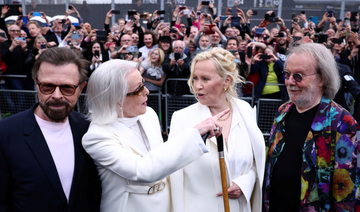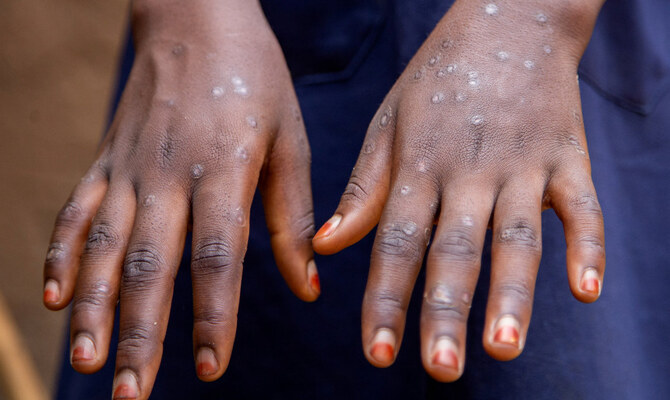KYIV, Ukraine: When the air raid siren bellows in the dead of night, the women in arms rush to duty.
Barely two months since joining the mobile air-defense unit, 27-year-old Angelina has perfected the drill to a tee: Combat gear fitted, anti-aircraft machine gun in place, she cruised behind the wheel of a pickup, singing along to a Ukrainian song about rebellion.
The rest unfolded in seconds: Under a tree-lined position near Kyiv’s Bucha suburb, she and her five-woman unit mounted the gun, checked the salvo and waited. The chirp of crickets filled the silence until the Russian-launched Shahed drone was shot down — on this August night, by a nearby unit — another menace to near daily life in Ukraine eliminated.
To shoot down a drone brings her joy. “It’s just a rush of adrenaline,” said Angelina, who like other women in the unit spoke to The Associated Press on condition only their first names or call signs be used, in keeping with military policy.
Women are increasingly joining volunteer mobile units responsible for shooting down Russian drones that terrorize Ukrainian civilians and energy infrastructure as more men are sent east to the front line.
While women make up only a tiny fraction of the country’s armed forces, their service is vital. With tens of thousands of men reportedly recruited every month, women have stepped up as crucial operations from coal mines to territorial defense forces accept them to fulfill traditionally male roles.
At least 70 women have been recruited into the Bucha defense forces in recent months for anti-drone operations, said the area’s territorial defense commander, Col. Andrii Velarty. It’s part of a nationwide drive to attract part-time female volunteers to fill the ranks of local defense units.
The women come from all walks of life — stay-at-home moms to doctors like Angelina — and call themselves the “Witches of Bucha,” a nod to their role of keeping watch over the night skies for Russian drones.
Some were motivated to volunteer by the Russian massacre of hundreds of Bucha residents during the monthlong occupation of the Kyiv suburb by Russian troops soon after the February 2022 invasion. Bodies of men, women and children were left on the streets, in homes and in mass graves.
“We were here, saw these horrors,” said Angelina, who treated wounded residents, including children, during the Russian occupation.
So when she spotted a sign calling for female recruits on a highway while driving in June with her friend, Olena, also a doctor, “we didn’t hesitate,” she said.
“We called and were immediately told ‘Yes, come tomorrow,’” she said. “There is work that we can do here.”
A grueling training
At a training session deep inside Bucha’s forest this month, female recruits ranging in age from 27 to 51 were being tested on how quickly they could assemble and disassemble rifles. “I have eighth graders who can do this better,” their instructor shouted.
The recruits were taught about a variety of weapons and mines, tactics and how to detect Russian infiltrators — their skills adapted to a war in which their enemy’s methods are always changing.
“We train no less than men,” said Lidiia, who joined a month ago.
A 34-year-old sales clerk with four children, Lidiia said her main motivation was to do her part to protect her family. Her children have looked at her differently since she began wearing army fatigues, she said.
“My younger son always asks, ‘Mom, do you carry a gun?’ I say, ‘Yes.’ He asks, ‘Do you shoot?’ I say, ‘Of course I do.’”
“I’ve always been the best for them, but now I’m the best in a slightly different way,” she said.
On July 31, she was on duty when Russia launched 89 Shahed drones, all of which were destroyed. Lidiia was an assistant machine-gunner that night.
“We got ready, we went to the call, we found that there were a lot of targets all over Ukraine,” she said. “We had night-vision devices so it was easy to spot the target.”
What did she feel as her unit shot down three of the drones? “Joy and some foul language,” Olena said.
After shooting down drones, the day job begins
When the sun rose, Angelina and Olena removed their heavy combat gear and went home to slip on surgical scrubs. Another shift, this time at the intensive care unit at the hospital where they work, was about to start.
By midnight, they would be back near the tree line, waiting for incoming Russian drones. “Today I slept for two hours and forty minutes,” Olena said.
There is no escape from the war for both women.
Their boyfriends are soldiers, and Angelina, an anesthesiologist, met hers at the hospital where he was recovering from a combat wound to his foot.
Seeing the numbers of wounded Ukrainian soldiers was one reason she decided to volunteer.
“To bring our victory closer. If we can do something to help, why not?” she said.
Angelina’s boyfriend worries every time she is on duty and the air raid alarm sounds. He texts her, “be careful” and when it ends, “write to me” — despite it being much scarier on the front lines, she said.
‘We are no longer women, we are soldiers’
The Russian drone attacks are typically more intense at night, but daytime attacks are just as deadly. The drone unit spends entire nights driving back and forth from their base in the forest to the position. Sometimes they stand there for hours waiting to shoot.
“There is nothing easy about it. In order to shoot it down, you have to train constantly,” Angelina said. “I have to train all the time, including on simulators.”
Their platoon commander, a confident woman with long braided hair who goes by the call sign Calypso, leads training in shooting, assault skills and combat medicine every Sunday.
There’s no difference between the male and female volunteers, she said.
“From the moment we come to serve, sign a contract, we are no longer women, we are soldiers,” she said. “We have to do our job, and men also understand this. We don’t come here to sit around and cook borscht or anything.”
“I have a feeling the girls and I would shoot down these Shaheds with our bare hands, with a stick, if we had to — anything to stop them from landing on our children, friends and family.”
The women in the mobile-fire units are on duty every two or three days. They work in groups of five, with a machine gunner, assistant, fire support, a driver and commander.
“Of course, war is war, but no one has canceled femininity,” Calypso said. “It doesn’t matter whether you hit a Shahed with painted eyes or not, the work is still going on. And not everyone has a manicure.”
As more women are trained to join the ranks of the territorial defense forces, the safer Ukraine’s skies will be, Angelina said.
“This means that I can make at least some small contribution to the fact that my mother sleeps peacefully, that my brothers and sisters go to school peacefully and they can meet their friends peacefully,” she said.
“So that my godsons can also grow under a relatively peaceful sky.”































